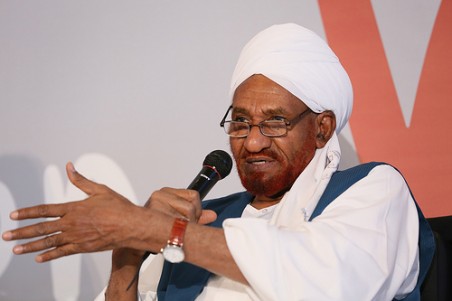
Introduction:
When Mr. Kofi Annan, as UN Secretary General, last visited the Sudan I said to him that the UN is between nations, but it functions as a union between Governments. In the last decades nongovernmental activity in society has become even more important. UN reform should cater for the International representation of nongovernmental society.
In the NUP we consider that although diplomats present their credentials to heads of state, they should extend their relations to nongovernmental society. It is in this mandate that I welcome your honors and present to your consideration this statement on five points:
First Point: We believe that the present Regime in Sudan has come to the end of its tether and the present crises it faces can only be resolved by change, which would realize comprehensive and just peace, and democratic transformation. This change must eschew violent means, and abide by nonviolent political action. Violent change would only result in the establishment of another dictatorship. For several reasons, the national dialogue which started early this year came to a false start. Therefore we welcome all internal and international efforts to streamline the process so that the processes of national accord and peacemaking be conducted through legislation, which would specify the aims of the process under consideration, specify the stakeholders, and indicate the roadmap towards the desired targets. We have already published proposals for that legislation.
Second Point: Sudan and its neighbors especially Egypt, South Sudan, the rest of the Horn of Africa, and Libya are facing problems which could only be resolved through a policy of mutual strategic cooperation. The NUP is active in the pursuit of that strategy.
Third Point: Our Arabic, African and Islamic Regions, especially the MENA Region is facing crises of multi-fronted tensions based upon the administration of diversity. The present conflicts of National identity suffer from seven basic fault lines. As President of the International Moderation Forum, my colleagues and myself are organizing a Regional conference to diagnose the situation, review all the current attempts of Islamization, and offer an Islamic prescription which would resolve the conflicts between Islam and secularism, conflicts within Islam between Sunna and Shia, conflicts within Sunni Islam, conflicts between Religious creeds, conflicts between cultural and ethnic communities, and social conflicts between the haves and have-nots. We believe that this approach would provide a prescription for an acceptable resolution of the conflicts which if left to themselves would tear the countries of the Region apart.
Fourth Point: As a member of the Club of Madrid, I have suggested to the club the need for an International Conference to discuss the various expressions of Islamic assertion, to evaluate the causes of the present surge of extremist and terrorist activity in the Region, to consider the fact that since 2001 the phenomenon metamorphosed from a single center into multi-centers, into competing networks and into would-be states. The causes are basically political in spite of the fact that they employ religious terms. Both Alqaeda and Daesh have International involvement in their parenthood. This phenomenon now threatens to make several states in the Region failed states and/or create conditions for more ironfisted dictatorship. Their activity will not stop at the Region’s borders. They constitute Terrorism without borders.
The International consequences are catastrophic. All such matters should be discussed and hopefully addressed by the expected conference.
Fifth Point: No doubt the injustices meted to the Jewish Peoples have persuaded many peoples to give moral justification for Israel. However, the policies of Israel towards its Palestinian victims are repeating what the Jewish Peoples suffered to the Palestinians. Yes self-defense is legitimate, but defense of illegitimate conquests is not warranted. The International Community cannot and should not tolerate the present massacre in Ghazza. If the International Community fails in its responsibility to protect, the scene in Ghazza, among other similar atrocities, will provide the best justification for recruitment of supporters by terrorist groups. The International Community bears responsibility for the creation of the state of Israel, and must bear equal responsibility for the protection of Palestinian rights. Failure to do so will provide wind for the sails of terrorism.
Finally: I welcome you, and thank you for your attention.

